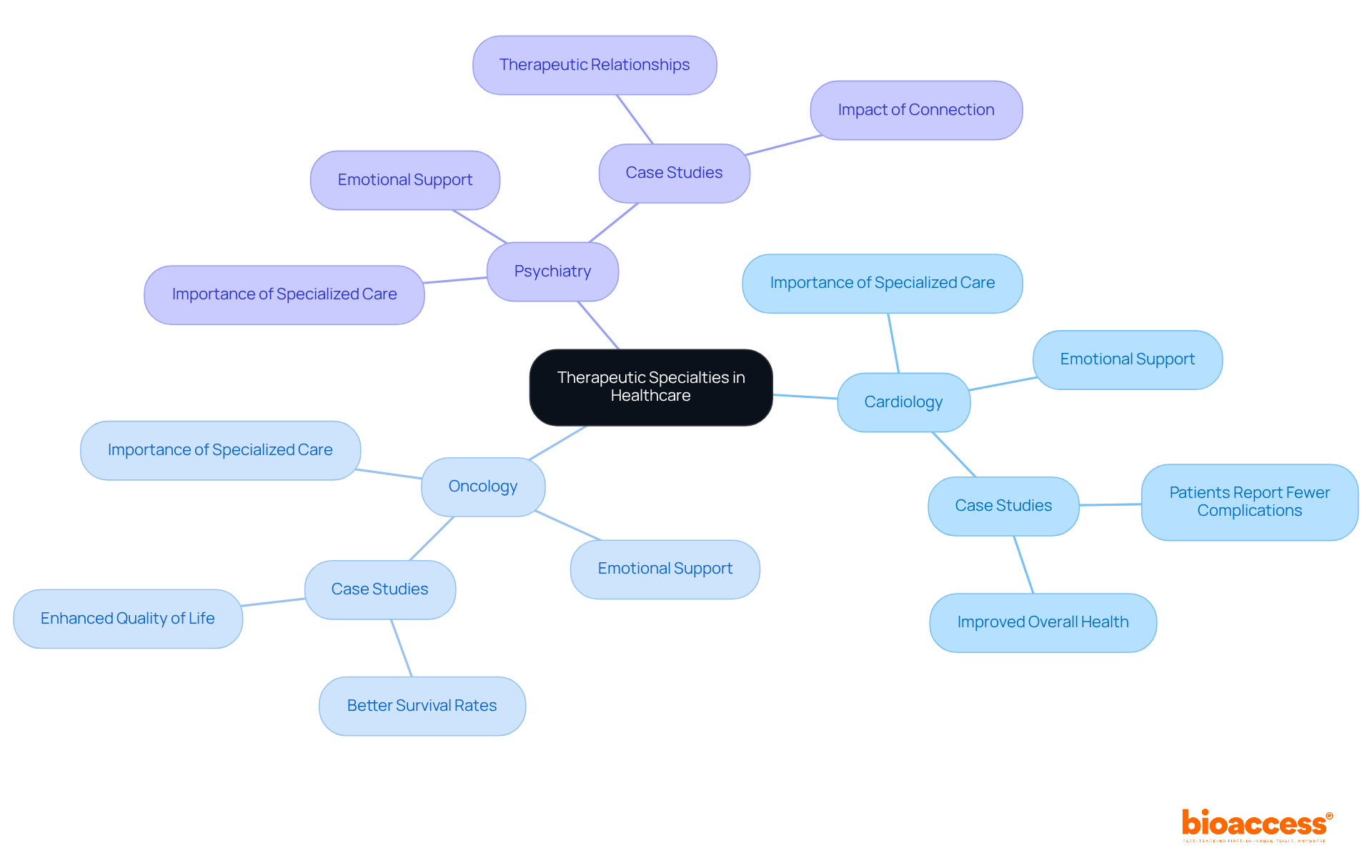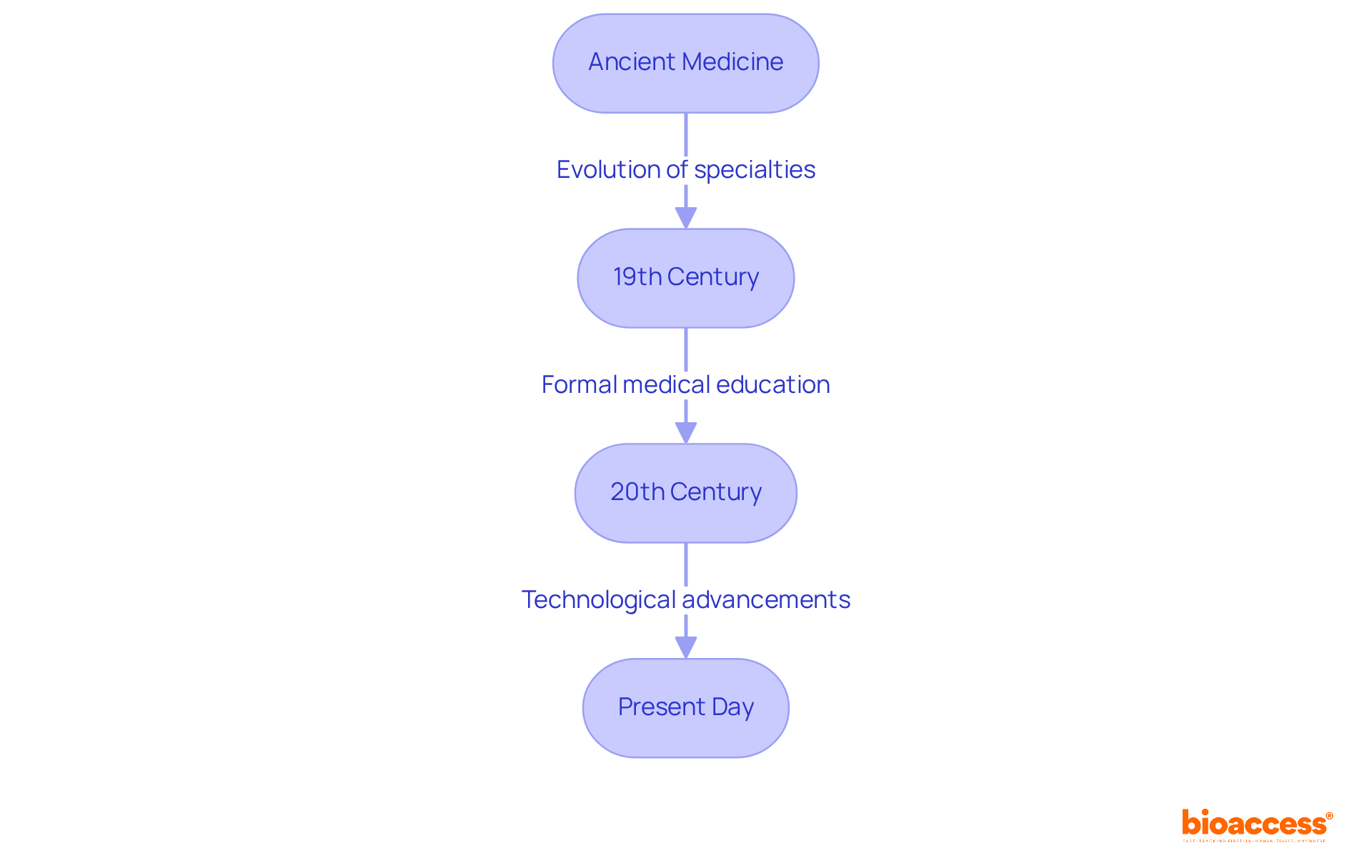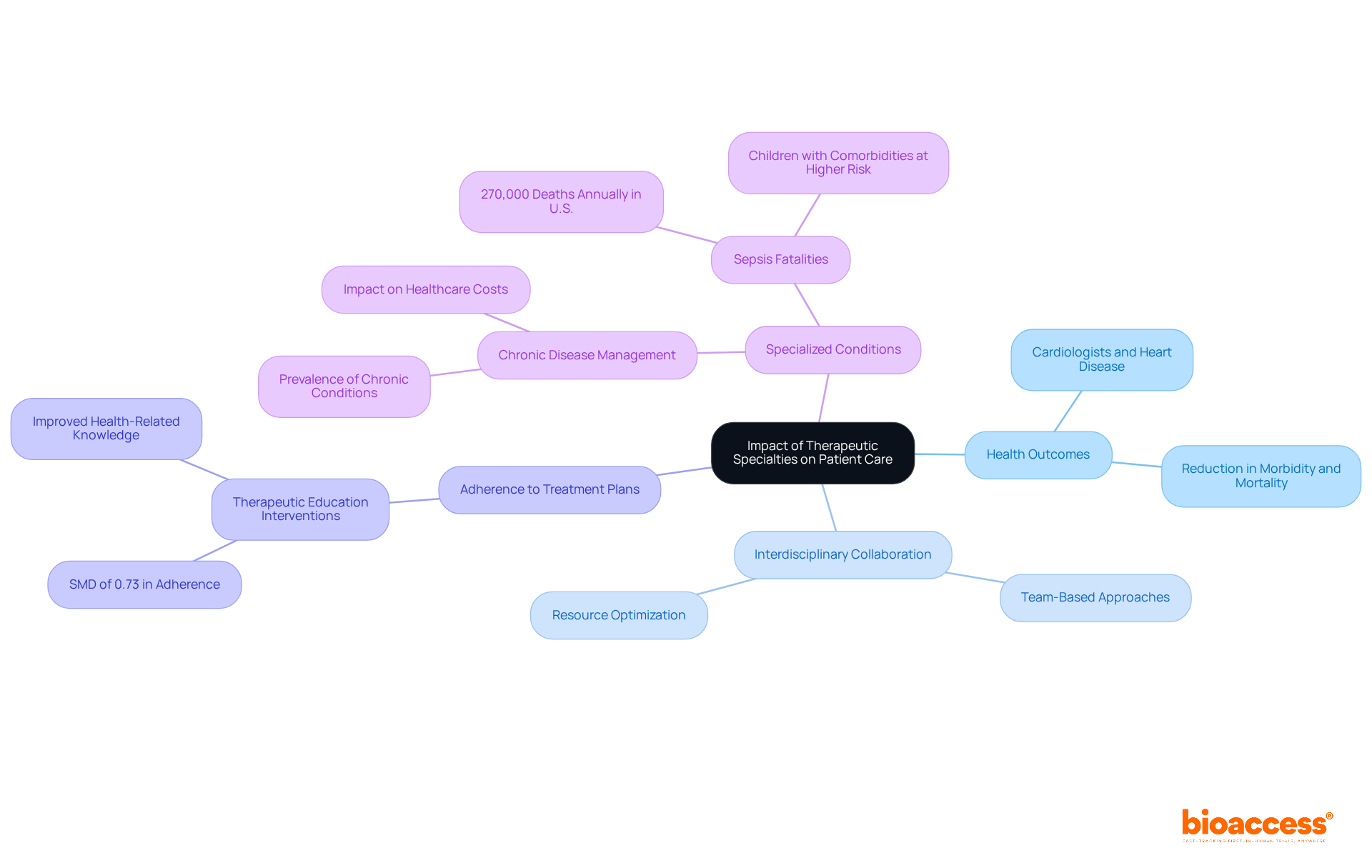


Therapeutic specialties are vital in healthcare, offering focused expertise in diagnosing, treating, and preventing specific diseases. This specialization leads to improved patient outcomes and satisfaction. Evidence supports this assertion, demonstrating that patients receiving specialized care experience better health management, reduced complications, and increased adherence to treatment plans. These findings underscore the critical role of targeted medical knowledge in enhancing overall healthcare quality.
Therapeutic specialties represent a vital segment of healthcare, focusing on specific medical fields to deliver targeted care and enhance patient outcomes. By concentrating expertise in areas such as:
these specialties not only improve treatment efficacy but also foster a more personalized approach to healthcare. As the landscape of medicine continues to evolve, it raises an important question: how can these specialties adapt to meet the growing complexities of patient needs and ensure optimal care? This inquiry is essential to understanding the future of clinical research and the role of specialized care in addressing emerging challenges.
Therapeutic fields encompass specific branches of healthcare dedicated to diagnosing, treating, and preventing diseases or conditions within defined areas. These areas of expertise span a wide range of medical disciplines, including:
Each addressing particular groups or health concerns. The importance of therapeutic specialties is evident in their ability to provide focused assistance, ensuring individuals receive the most effective treatments tailored to their unique needs. By concentrating knowledge in these fields, healthcare providers can enhance service quality, improve outcomes for individuals, and streamline treatment processes.
Expert opinions underscore the necessity of specialized treatment for optimizing patient experiences and outcomes. As noted, "Patients may not recall all the medical information, but they do remember how they were treated." This highlights the emotional aspect of support, which is particularly relevant in therapeutic fields where complex conditions require nuanced understanding and management strategies.
Case studies illustrate the benefits of specialized treatment. For instance, the case study titled "The Importance of Human Connection in Healthcare" reveals that individuals often prioritize the feeling of being cared for over the technical expertise of their healthcare providers. This connection builds trust and enhances the healing process, resulting in improved health outcomes.
Moreover, studies indicate that individuals treated by oncologists in specialized facilities experience better survival rates and an enhanced quality of life compared to those receiving care in general settings. Similarly, in cardiology, patients with heart issues managed by cardiologists report fewer complications and improved overall health.
In conclusion, therapeutic specialties are vital to medical services by providing targeted expertise that improves care for individuals, leading to better outcomes and increased satisfaction. Addressing the emotional needs of patients and preventing healthcare provider burnout are essential for maintaining the efficacy of these fields.

The development of therapeutic specialties traces its origins to ancient medicine, where healers concentrated on specific ailments and body systems. As medical knowledge advanced, the need for therapeutic specialties became increasingly apparent. The 19th century marked a pivotal era with the establishment of formal medical education, leading to the recognition of fields such as surgery and obstetrics. This foundational period set the stage for a more organized approach to medical practice. The 20th century brought extraordinary advancements in technology and research, leading to the emergence of various therapeutic specialties that facilitated more precise and effective treatments. Notably, the advent of anesthesiology and radiology revolutionized surgical practices and diagnostic capabilities, respectively. In the present day, therapeutic specialties are in a continual state of evolution, adapting to new scientific discoveries and the ever-changing landscape of healthcare. This ongoing transformation underscores the medical community's commitment to enhancing healthcare outcomes through specialized knowledge and innovative practices.

A diverse range of therapeutic specialties encompasses fields that are each dedicated to addressing specific health needs and enhancing outcomes for individuals. These specialties can be categorized as follows:
Medical Specialties: These focus on diagnosing and treating particular diseases or patient populations. For instance, cardiology specializes in heart conditions, while oncology is dedicated to cancer treatment. The integration of advanced technologies, such as AI tools like Google's DeepMind, which have shown superior performance in identifying breast cancer compared to radiologists, is revolutionizing personalized treatment strategies and improving healthcare outcomes.
Surgical Specialties: These involve operative procedures aimed at treating various conditions. Notable examples include orthopedic surgery, which addresses musculoskeletal issues, and neurosurgery, which focuses on the brain and nervous system. The surgical robotics market is projected to reach approximately 12.6 billion U.S. dollars by 2025, reflecting the increasing reliance on innovative surgical techniques.
Psychiatric Specialties: These specialties address mental health disorders, with subspecialties such as child psychiatry and addiction medicine. Telehealth has emerged as a crucial tool in this field, facilitating enhanced access to care and continuity for individuals, particularly in underserved regions. According to the American Psychiatric Association, "Telehealth provides individuals a safe, secure, HIPAA-compliant environment to address mental illness or condition in the comfort of their own homes," underscoring its significance in mental health treatment. In 2022, over 27,000 licensed clinical social workers utilized telehealth, highlighting its importance.
Rehabilitative Specialties: Aimed at restoring function and enhancing quality of life, these include physical therapy and occupational therapy. The development of exoskeletons to assist in rehabilitation for individuals with stroke or spinal cord injuries represents a significant advancement, enabling them to regain mobility and strength.
Each of these therapeutic specialties plays an essential role in the healthcare system, working together to provide comprehensive, patient-centered support tailored to individual needs. The ongoing integration of technology and innovative approaches enhances the efficacy of these specialties, ultimately leading to improved outcomes for individuals.

Therapeutic specialties play a crucial role in enhancing healthcare by providing focused expertise that significantly improves the effectiveness of treatments. Research indicates that individuals under the care of specialists often experience superior health outcomes, including notable reductions in morbidity and mortality rates. For instance, individuals with complex conditions, such as heart disease, benefit immensely from the specialized knowledge of cardiologists, leading to more effective management and tailored treatment plans. Moreover, therapeutic specialties facilitate interdisciplinary collaboration, enabling medical teams to thoroughly address complex health issues. This collaborative approach not only improves satisfaction among individuals but also optimizes resource utilization within healthcare systems.
Significantly, research has shown that compliance with treatment plans improves markedly when individuals receive specialized support. Therapeutic education interventions demonstrate a standardized mean difference (SMD) of 0.73 in boosting adherence. Furthermore, sepsis results in 270,000 fatalities each year in U.S. hospitals, highlighting the urgent necessity for specialized treatment in managing such intricate conditions. Integrating therapeutic specialties into patient care pathways is essential for advancing healthcare quality and efficiency.

Therapeutic specialties are pivotal to the healthcare landscape, delivering focused expertise that significantly enhances the quality of care for patients. By concentrating on specific medical fields, such as cardiology, oncology, and psychiatry, these specialties ensure individuals receive tailored treatments that effectively address their unique health concerns. The concentrated knowledge within these areas not only improves patient outcomes but also promotes a more efficient healthcare system.
This article illustrates the historical evolution of therapeutic specialties, showcasing how advancements in medical knowledge and technology have shaped their development. From ancient practices to the sophisticated, interdisciplinary approaches seen today, therapeutic specialties have consistently adapted to meet the changing needs of patients. The integration of innovative tools, including telehealth and AI technologies, underscores their vital role in modern healthcare, enhancing both accessibility and treatment efficacy.
Ultimately, the significance of therapeutic specialties transcends mere medical treatment; they embody a commitment to patient-centered care that prioritizes emotional support and holistic healing. As healthcare continues to evolve, embracing these specialized fields is essential for improving overall health outcomes and ensuring that each individual receives the comprehensive care they deserve. Engaging with therapeutic specialties not only optimizes treatment effectiveness but also reinforces the foundational principle of healthcare: to provide compassionate, informed, and effective care for all.
What are therapeutic specialties in healthcare?
Therapeutic specialties are specific branches of healthcare focused on diagnosing, treating, and preventing diseases or conditions within defined areas, such as cardiology, oncology, and psychiatry.
Why are therapeutic specialties important in healthcare?
Therapeutic specialties are important because they provide focused assistance, ensuring individuals receive effective treatments tailored to their unique needs, which enhances service quality and improves patient outcomes.
How do therapeutic specialties impact patient experiences?
Expert opinions highlight that specialized treatment optimizes patient experiences, as patients may not remember all medical information but do recall how they were treated, emphasizing the emotional aspect of support in healthcare.
What do case studies reveal about the benefits of specialized treatment?
Case studies, such as 'The Importance of Human Connection in Healthcare,' show that individuals often prioritize feeling cared for, which builds trust and enhances the healing process, leading to improved health outcomes.
What evidence supports the effectiveness of therapeutic specialties?
Studies indicate that patients treated by oncologists in specialized facilities have better survival rates and quality of life, and cardiology patients managed by cardiologists report fewer complications and improved overall health.
How do therapeutic specialties address patient emotional needs?
Therapeutic specialties focus on addressing the emotional needs of patients, which is essential for building trust and improving the overall efficacy of care.
What is the significance of preventing healthcare provider burnout in therapeutic specialties?
Preventing healthcare provider burnout is crucial for maintaining the efficacy of therapeutic specialties, ensuring that providers can deliver high-quality care to their patients.